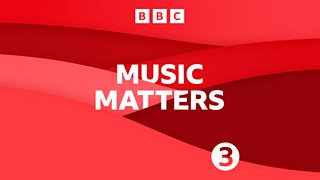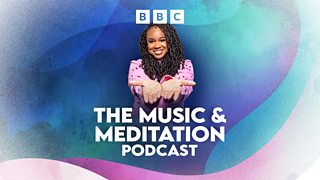Six things we learned about the power of music on mental health

“I think that instinctively we all know that music can make us feel better. I think the really interesting question though is – why?” – Professor Sally Marlow
To mark World Mental Health Day, Tom Service presents a special Music Matters in collaboration with Professor Sally Marlow, a mental health specialist at King’s College London and 91�ȱ� Radio 3’s first ever researcher in residence.
The show includes powerful personal stories from composers and performers nationwide, exploring the symbiosis between music-making and mental health. They discuss projects that evidence how music helps a whole range of mental health conditions across our society from health care to concert halls.
Below are six things we learned.
-
![]()
Music Matters: Music and Mental Health
To mark World Mental Health Day, Tom Service presents a special programme in collaboration with Professor Sally Marlow. Listen now.
1. One music project is bringing connection and “moments of joy” to children in hospital
Sound Young Minds is a music-making programme that aims to help young people under the care of psychiatric hospitals. The project is “an extreme example,” explains Sally. “It’s with very, very unwell children. Children who are patients in the Bethlem and Maudsley hospitals… It’s a music project that works with those children, some of whom are non-verbal, and it makes a real difference to their lives.”
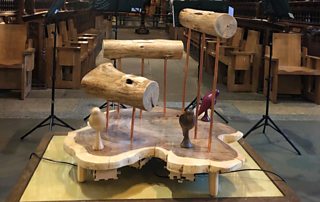
Fiona Lambert from , who run the project, explains how its aim is to find ways of connecting through music. “It’s not about our players coming and playing to people,” she says. “It’s about exploring classical music together by making something together.”
“We’re not changing a diagnosis,” says Fiona, “but I think what we’re bringing and what we’re trying to leave behind are moments of joy in a really dark time in those young people’s lives. Hopefully there are some positive memories being created in this time, in those moments.”
For composer and artist , a larger aim is to break down the barrier between musical “experts” and the rest of us. “I am terrible at playing football, and yet we can all understand that if I go and play a game of football that’s really good for me,” he says, both physically and socially.
“I’d like to see that same understanding coming into music-making. That you don’t need to be good at music-making in order to make music together, and who gets to say what good music-making is anyway?”
2. Singing has been shown to speed up recovery from symptoms of postnatal depression
Post-natal depression effects one in eight new mothers, says Daisy Fancourt, an associate professor at University College London, and is “exacerbated by the very things that are part and parcel of being a new mother, like sleep deprivation and social isolation and hormones.” It can be treated with medication and psychological therapies, but these have quite low uptake and adherence.

So, in 2015, Daisy began working with the Royal College of Music and Imperial College to design a ten-week singing programme, bringing mothers with post-natal depression together, with their babies, to engage in singing.
“We conducted a trial where we compared mothers with post-natal depression who engaged in that singing programme with mothers who engaged in usual NHS care, and mothers who engaged in comparison social activities with their babies, and we found there was a much faster improvement in symptoms in those in the singing group,” she says. They saw a 35% decrease in symptoms within the first six weeks and, by the end of the programme, three quarters of the mothers no longer actually had post-natal depression.
3. The NHS has started prescribing music classes
James Sanderson from NHS England explains how a new initiative, where patients get a prescription to a community-based activity, benefited over a million people last year.
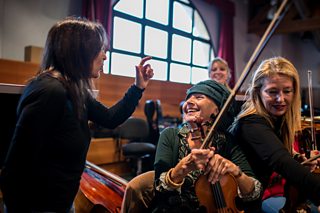
“ responds to the fact that one in five GP visits these days are for purely non-medical needs,” says James. “People are going to see their GP with issues of loneliness and social isolation.” Social prescribing connects them to activities like art classes and music sessions, as well as sports and outdoor activities. “The evidence base shows a significant impact to health and wellbeing,” he says.
“We’ve also got the opportunity through social prescribing to get more people involved in music. More people appreciating music, more people accessing live music concerts, taking part in singing, taking part in orchestras. That’s got to be a good thing for health and also the music industry.”
However, though the NHS is beginning to recognise that music is a vitally important part of clinical care, it needs to go further, argues Sally: “What we’re still doing in mental health is we’re treating when people are in crisis instead of focusing on prevention. And actually, music programmes, particularly for children and young people – because most mental health problems start when you’re in childhood or adolescence – is much more preventative and gives young people and children a much better chance of a mentally healthy adulthood and life going forwards.”
4. Music can bring respite from the symptoms of OCD
For composer , playing in a brass band had a transformative effect on the mental health conditions that he developed in childhood.
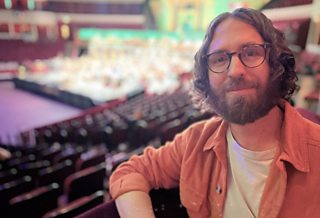
Growing up in a band family, music was always a massive part of his life. “I think I started playing a cornet when I was about three, so no recollection of learning to play. And I think I must have been about seven or eight when I started to develop facial tics,” says Gavin. The tics were profound and got increasingly worse. “I also started developing OCD symptoms…"
At the Maudsley Hospital he was asked what happened to his symptoms when he was playing music. It dawned on him then: they stopped. “It was the first time I’d said that and the first time I’d realised that and so music then went from being just something I did to something I used as a real therapy,” says Gavin. “I did it more and more and more. Every chance I had I was playing my instrument. And I would completely lose myself in it. He was lucky to have music on his doorstep, but he believes every child should have the same opportunity. “I think things like music seem frivolous when people can’t heat their homes and people can’t afford to feed their kids,” he says. “But it’s not a frivolous thing. It’s important. It’s lifesaving.”
5. Heavy metal music has given young people in County Durham an opportunity to express themselves
Sally has worked with a community arts organisation called , providing music sessions to support the mental health of young people in Crook, County Durham.

“Jack Drum is a project which is in a former mining community,” says Sally. “It’s a rural area, there’s a high level of deprivation, and not many opportunities for children and young people and the community more widely. It’s great to have seen over the last five years the changes that have come about in the lives of the young people who go there.”
James is one of the session leaders. “I’ve been here a while. I was participant when I was eight or nine and I’m 31 this year. I’m quite open: my mental health is certainly not at its optimum at any given moment. I’m very specifically medicated for OCD, a very intense OCD, but the music side of things, it’s a focus.”
Jay is now a director at Jack Drum Arts but has been involved since he was five. “I grew up in what they call socially deprived circumstances, and it was always kind of a lifeline,” he says. “A lot of us had issues to do with school, issues to do with family, and so when we came here it was just an equal space. I was the singer-songwriter, so I wrote the lyrics and sang the songs. For me that was a really good way to project the kind of stuff that was going on, the stuff that I was feeling.”
Heavy metal music has got a bad rep and is seen as angry and shouty, says Brendan, another session leader. “But metal music isn’t that,” he argues. “Some heavy metal music is absolutely beautiful, and it really is a way to express feelings.”
6. Research has shown that “sad” music can be uplifting and drumming can reduce depression
For World Mental Health Day, Sally has curated a special In Tune Mix Tape: Music for the mind.

“Sifting through the evidence about how different types of music can have different effects on people’s mood and on their mental health was quite a task, and what we tried to do was identify areas where there was a lot of evidence,” explains the mental health researcher. “So, for this Mixtape we chose Bach’s Prelude in C Major, because the research tells us that sad music can actually be uplifting.”
“We chose some drumming, Moondog, because we know that drumming can reduce depression and anxiety. And you couldn’t have a mixtape about music and mental health without acknowledging its power for people with dementia so we chose Four Notes – Paul’s tune by Paul Harvey, who’s a former music teacher living with dementia.”
“We also wanted to acknowledge that the power of music to make us feel better is universal, so there’s a bit of Sufi music in there too.”
If you’ve been affected by any of the issues raised here, the following organisations offer support:

-
![]()
Music Matters: Music and Mental Health
To mark World Mental Health Day, Tom Service presents a special programme in collaboration with Professor Sally Marlow.
-
![]()
Five ways to improve your resilience with meditation
How meditation can help you cope with stress.
-
![]()
10 reasons to take 10 minutes out for daily meditation
Our guides explain some of the amazing benefits meditation can bring to your everyday life.
-
![]()
The Music & Meditation Podcast
Join NAO to escape the noise of daily life through the power of music and meditation.

